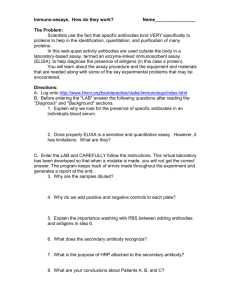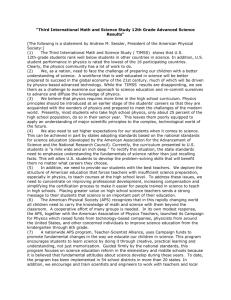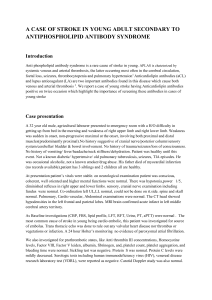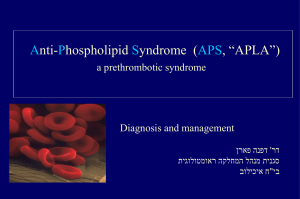Should Test for Anti- 2GPI Antibodies be done in - Medica-Tec
advertisement
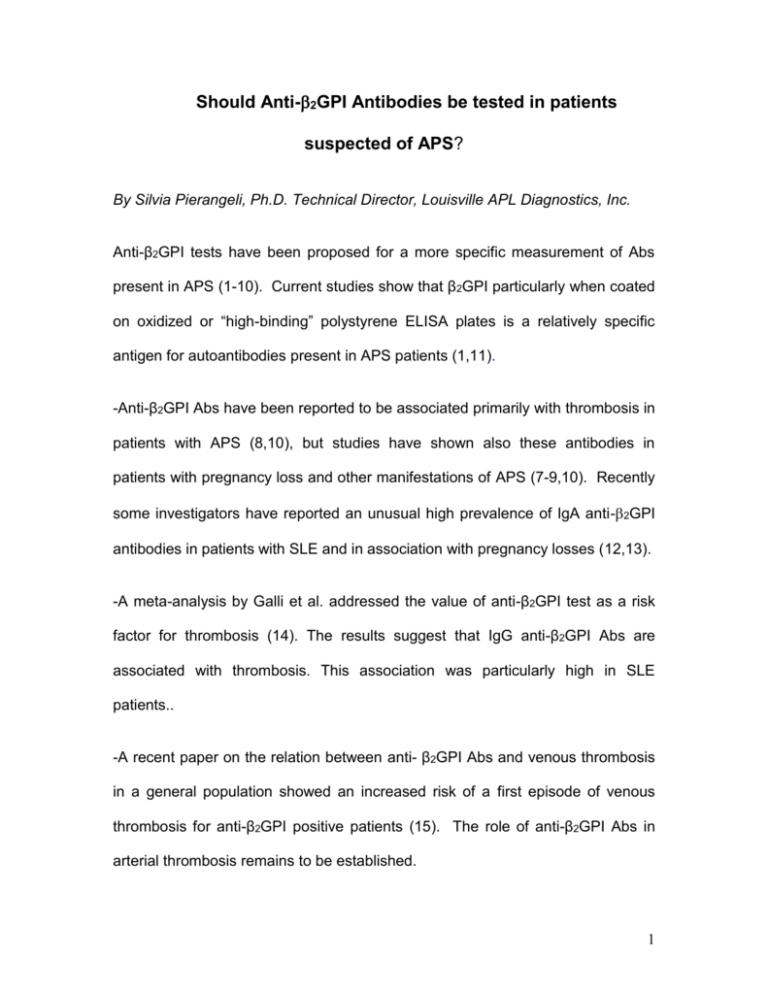
Should Anti-2GPI Antibodies be tested in patients suspected of APS? By Silvia Pierangeli, Ph.D. Technical Director, Louisville APL Diagnostics, Inc. Anti-β2GPI tests have been proposed for a more specific measurement of Abs present in APS (1-10). Current studies show that β2GPI particularly when coated on oxidized or “high-binding” polystyrene ELISA plates is a relatively specific antigen for autoantibodies present in APS patients (1,11). -Anti-β2GPI Abs have been reported to be associated primarily with thrombosis in patients with APS (8,10), but studies have shown also these antibodies in patients with pregnancy loss and other manifestations of APS (7-9,10). Recently some investigators have reported an unusual high prevalence of IgA anti-2GPI antibodies in patients with SLE and in association with pregnancy losses (12,13). -A meta-analysis by Galli et al. addressed the value of anti-β2GPI test as a risk factor for thrombosis (14). The results suggest that IgG anti-β2GPI Abs are associated with thrombosis. This association was particularly high in SLE patients.. -A recent paper on the relation between anti- β2GPI Abs and venous thrombosis in a general population showed an increased risk of a first episode of venous thrombosis for anti-β2GPI positive patients (15). The role of anti-β2GPI Abs in arterial thrombosis remains to be established. 1 -Studies from several laboratories suggest that the sensitivity of the anti-β2GPI test for APS vary from 40% to 90% (1-13). -Kaplan et al. demonstrated that positivity alone of anti-β2GPI Abs in the absence of aCL positivity was observed only in 2 % of the samples (15). The authors concluded that, in aCL and/or LA positive patients, anti-β2GPI test provides little additional diagnostic value. These results suggest that perhaps anti-β2GPI should be ordered to confirm APS (since it is more specific than aCL tests) and in situations when all other (aCL and LA tests) is negative and there is strong suspicion for APS. -The value of multiple aPL Ab specificity has been addressed in few studies. Detkova et al. observed that the simultaneous presence of circulating LA and high titers of both aCL and β2GPI Abs identified a subset of patients with primary APS who had a more severe clinical course of the disease. They recommend performing anti-β2GPI Abs besides LA and aCL in order to alert the physician about the risk of a more severe course of the illness (16). These data were then confirmed by Lee et al. (17) who demonstrated that the rate of thrombosis increased significantly from patient populations with single (27.6%) to patients populations with double (38.8%) or triple (66.7%) positivity. In this study, single positivity for anti-β2GPI accounted for 9–12% of thrombotic events and they concluded that anti-β2GPI provides additional important information (18). The majority of the studies published so far conclude that IgG anti-β2GPI is an important additional tool for the diagnosis of APS. Although, based on those 2 reports, no definite conclusion can be drawn with respect to the strength of the association of thrombosis and anti-β2GPI Abs, it seems that anti-β2GPI measurement is an additional helpful test besides LA and aCL. Its specificity seems better than aCL and it could allow the definition of APS in patients negative for LA and aCL. Based on that, an international committee of experts that gathered at the XIth International Congress on Antiphospholipid Antibodies in Sydney, Australia (November 2004) determined that the anti-β2GPI assay should be included in the screening panel for APS, particularly because it has been shown that anti-β2GPI may be the sole antibody present in up to 10% of the patients with clinical features of APS (15,19,20) (Table 1). 3 References cited 1. Roubey RAS, Eisenberg RA, Harper MF, Winfield JB. Anticardiolipin autoantibodies recognize β2glycoprotein I in the absence of phospholipid: importance of antigen density and bivalent binding, J Immunol 1995; 154: 954– 960 2. Balestrieri G, Tincani A, Spatola L et al. Anti-β2glycoprotein I antibodies: a marker of antiphospholipid syndrome?, Lupus 1995; 4: 122–130 3. Arvieux J, Pouzol P, Roussel B, Jacob MC, Colomb MG. Lupus-like anticoagulant properties of murine monoclonal antibodies to β 2glycoprotein I, Br J Haematol. 1992; 81: 568–573 4. Viard JP, Armoura Z, Bach JF. Association of anti-β2glycoprotein with lupus circulating anticoagulant and thrombosis in SLE. Am J Med 1992; 93:181–186. 5. Cabiedes J, Cabral A, Alarcon-Segovia D. Clinical manifestations of the antiphospholipid syndrome in patients with systemic lupus erythematosus associate more strongly with anti-β2glycoprotein 1 than with antiphospholipid antibodies, J Rheumatol 1995; 22: 1899–1906 6. Lewis S, Keil LB, Binder WL, De Bari V. Standardized measurement of major immunoglobulin class (IgG, IgA and IgM) antibodies to β 2glycoprotein 1 in patients with antiphospholipid syndrome, J Clin Lab Anal 1998; 12: 293–297 7. Katano K, Aoki A, Sasa H, Ogasawara M, Matsuura E, Yagami Y. β2glycoprotein I-dependent anticardiolipin antibodies as a predictor of adverse pregnancy outcomes in healthy pregnant women, Hum Reprod 1996; 11: 509– 512 4 8. Martinuzzo ME, Forastiero RR, Carreras LO Anti-β2glycoprotein antibodies: detection and association with thrombosis. Br J Haematol 1995; 89: 397–402 9.Ogasawara M, Aoki K, Matsuura E, Sasa H, Yagami Y. Anti-β2glycoprotein antibodies and lupus anticoagulant in patients with recurrent pregnancy loss: prevalence and clinical significance. Lupus 1996; 5: 587–592 10. Tsusumi A, Matsuura E, Ichikawa K, et al. Antibodies to β2glycoprotein I and clinical manifestations in patients with systemic lupus erythematosus, Arthritis Rheum 1996; 39: 1466–1474 11. Matsuura E, Igarashi Y, Yasuda T, Triplett DA, Koike T. Anticardiolipin antibodies recognize 2glycoprotein I structure altered by interacting with an oxygen modified solid phase surface. J Exp Med. 1994; 179: 457-462 12. Fanopoulos D, Teodorescu MR, Varga J, Teodorescu M. High frequency of abnormal levels of IgA anti-2glycoprotein I antibodies in patients with systemic lupus erythematosus: relationship with Antiphospholipid syndrome. J Rheumatol 1998; 25:675-680 13. Lee RM, Branch DW, Silver RM. Immunoglobulin A anti-β2glycopotein antibodies in women who experience unexplalined recurrent spontaneous abortion and unexplained fetal death. Am J Obstet Gynecol 2001; 185: 748-753 14. Galli M, Luciani B, Bertolini G, Barbui T. Anti-β2glycopotein I, antiprothrombin antibodies and the risk of thrombosis in the antiphospholipid syndrome, Blood 2003; 102: 2717–2723 5 15. Kaplan V, Erkan V, Derksen W, L. et al. Real world experience with antiphospholipid antibodies (APL): how useful is anti-β2glycoprotein (β2GPI) test? Arthritis Rheum 2004; p. S67 [abstract]. 16. .Detkov D, Gil-Aguado A, Lavilla P, Cuesta MV, Fontan G, Pascual-Salcedo D. Do antibodies to β2glycopotein I contribute to the better characterization of the antiphospholipid syndrome? Lupus 1999; 8: 430-438 17. Lee EY, Lee CK, Lee TH et al. Does the anti-β2glycopotein I antibody provide additional information in patients with thrombosis, Thromb Res 2003; 111: 29–32 18. Reber G, Schousboe I, Tincani A et al. Inter-laboratory variability of antiβ2glycoprotein I measurement. A collaborative study in the frame of the European Forum on Antiphospholipid Antibodies Standardization Group. 2002; Thromb Haemost 2002; 88: 66–73 19.Miyakis S, Lockshin MD, Atsumi T et al. International consensus statement on an update of the classification criteria for definite antiphospholipid syndrome (APS). J Thromb Haemost. 2006; 4: 295-306 20. Nash MJ, Camilleri RS, Kunka S, Mackie IJ, Machin SJ, Cohen H. The anticardiolipin assay is required for sensitive screening for antiphospholipid antibodies, J Thromb Haemost 2004; 2: 1077–1081 6 Table 1. Current Laboratory Test included in the Sydney criteria for definite APS (19) LA present in plasma, on two or more occasions at least 12 weeks apart, detected according to the guidelines of the International Society of Haemostasis (Scientific Subcommittee on LAs/phospholipid-dependent antibodies) aCL antibodies of IgG and/or IgM isotype in serum or plasma, present in medium to high titer (i.e.: >40 GPL or MPL, or >99th percentile), on two or more occasions, at least 12 weeks apart, measured by standardized ELISA Anti- 2GPI antibodies of IgG and/or IgM isotype in serum or plasma (in titer>99th percentile), present on two or more occasions, at least 12 weeks apart, measured by a standardized ELISA, according to recommended procedures Abbreviations: aCL: anticardiolipin APS: antiphospholipid syndrome LA: lupus anticoagulant 2GPI: 2glycoprotein I. 7
